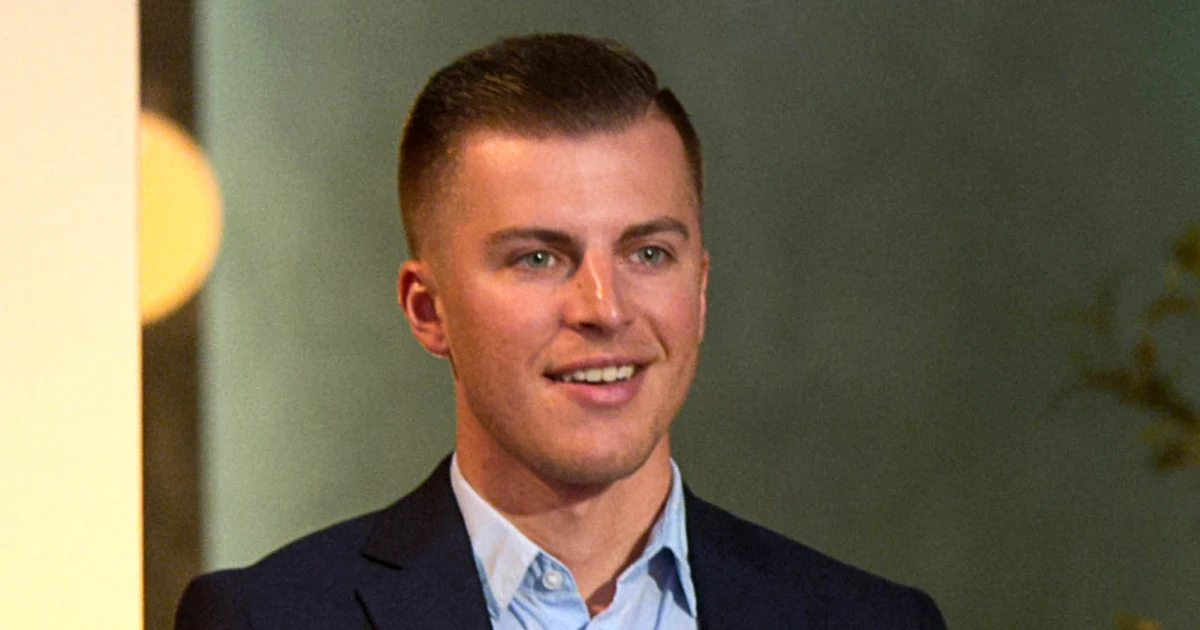
“Love Is Blind” viewers had a lot to say about Nick Amato and Annie Lancaster’s conversation about LGBTQ+ children.
The two singles, who later went on to get engaged, discussed the topic of parenting a child who belongs to the LGBTQ+ community in Episode 4 of Season 9 of the dating show.
Now, Nick is responding to viewers who weren’t pleased with how the conversation went. Below, we’re outlining everything you need to know about the controversy and his response.
What Did Nick and Annie Say in the Dating Pods?
While getting to know each other in the “Love Is Blind” pods, Nick and Annie started talking about their desire to have children one day.
Nick then posed the following question to Annie: “How would you react if at some point your child told you they were LGBTQ+?”
“No matter what, I’m always going to love my kids. But I can’t tell you I would be the first person to be like, ‘Yay!’ You know what I mean?” Annie responded.
“I do know exactly what you mean,” Nick said.
Annie went on to explain her response, saying, “I’ll support my kids, but (would be) making sure that they’re informed. Like, ‘Do you know what you’re doing? Do you know what you’re getting into? Do you know what you’re signing up for?” she said.
Nick then asked Annie if she thinks certain subsets of the LGBTQ+ community are “a fad.”
“100%,” she said.
Nick then explained why he would be concerned if his child’s friend suggested they might be a member of the LGBTQ+ community.
“When kids start having those thoughts too young — and maybe I am old fashioned — but it’s like a concern for me because who’s telling you that?” he said.
Nick went on to recall a time in high school where he was “depressed.” Concerned about his well-being, his mother was curious if something bigger was going on and asked if her son was gay. He said no.
The conversation elicited a strong response from viewers.
“Nick and Annie’s conversation about potential children identifying as LGBTQIA is sickening beyond belief and a tragic reminder of what our youth are facing. People deserve more than this,” one X user commented.
Another penned the following reaction: “Watching love is blind and genuinely shocked that netflix included the conversation between Annie and Nick talking about if they would be okay having lgbtq+ kids.”
One social media user also commented, “I’ll be fast forwarding through all of Annie and Nick scenes after that gross homophobic conversation.”
What Did Nick Say About the Backlash?
Nick took to Instagram to share a response to viewer backlash. In a video message, Nick said the “gay kids and gay love conversation” had been “deeply impacting me over the last couple of days.”
“I appreciate you giving me all the hell that you did and saying, ‘That’s not right.’ Yes, it was cut up and edited, but I need to take accountability too,” he said.
Nick admitted “there’s a lot that I didn’t understand.”
The Season 9 star also clarified the use of the term “fad” in his conversation with Annie, saying they were referring to “over-introducing sexual content material to kids’ shows at a young age or the idea of gay identity.”
Nick said he would “love my kids regardless” of their sexual identity and brought up the example of his mother questioning him if he was gay in high school.
“I laughed it off and you know, I said, ‘Oh no, there’s no way!’ But why would I have had to defend myself for that? You know, it doesn’t make any sense because being gay is perfectly normal but I wasn’t normalized to that,” he said.
Nick ended his video by saying he wanted to use his platform to inform others and not spread hate.
“There’s so much hate in this world. If I can’t use this platform to help introduce people who used to think like I did to some of these new ideas … if I can’t use that platform for good then it’s a platform wasted.”
In the caption, he wrote, “I take full accountability for how my words came across but I am glad it provoked this discussion and my learning. I was born in a traditional Midwestern environment, and I now recognize how that shaped certain blind spots (I’m thankful for the support of my friends recently for helping me learn this).”